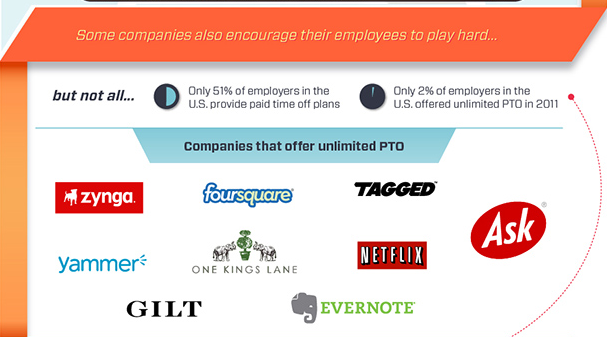While unlimited paid time off (PTO) is offered by less than 5 percent of U.S. employers, it seems you can’t throw a dart in Austin and other Texas technology hubs without hitting a company offering it. In fact, most technology recruiters will tell you: Various forms of unlimited PTO are fast becoming the standard.
“Especially with small- to medium-size technology companies, unlimited PTO is a very popular addition to the benefit package,” says Jay Long, managing director of The HT Group Search Division.
Sam Decker, co-founder and CEO of Austin-based Mass Relevance (which recently joined forces with Spredfast), says the organization’s “Freesponsibility” policy allowing employees unlimited vacation and no set work hours is based on something called the “Pygmalion Effect.” He explained to Fast Company “the “Pygmalion Effect” says the more trust you put in someone, the more they will fulfill that trust.”
Similar sentiments are shared by companies like Zynga, RetailMeNot, Inc., SpareFoot, and LIVESTRONG, which all offer some version of an open vacation policy. As The Washington Post reports, “At companies such as Netflix, Hubspot and Evernote, employees can take what they want, when they want it—as long as they get their work done, get the time approved and get things covered while they’re away. In a sense, they’re treated like adults.”
So, aside from the unsubstantiated fear of employees bolting for the door at every available opportunity, what’s there to lose? Or, conversely, is there enough to gain?
(Click on image to see the entire infographic)
Christina Gomez, a partner with the law firm Holland & Hart tells Fox Business, unlimited vacation “enables companies to provide an additional job ‘perk’ with little to no added cost. [Because] the idea is that even if employees are taking more vacation time than they used to, they are more productive during the time they are at work. It can [also] improve efficiency and productivity by incentivizing employees to get their work done more efficiently so they can take time off.”
However, many of tech companies—and, more historically, law firms and financial companies—have gotten flack for their perceived unlimited PTO policies. Between project demands and professional decorum, employees often feel unable to risk stepping away from their jobs for too long.
In addition, it’s important to note: Everything—including unlimited PTO—should have its limits. The legal wording and conditions of the policy must be carefully crafted. For instance, two weeks advanced notice must be given pending the approval of a supervisor. Even then, it’s important to have the policy reviewed by an attorney. As this SHRM.org article points out, poorly worded policies may violate or fall under the jurisdiction of the Family and Medical Leave Act (FMLA), Americans with Disabilities Act, or even the Civil Rights Act of 1964.
After all, “the question remains,” states the SHRM.org article, “whether courts will accept the practice of not paying out vacation time when employees exit the company.”
Image Copyright: mj007 / 123RF Stock Photo
Infographic: Flickr user John Nuttall via Fast Company




